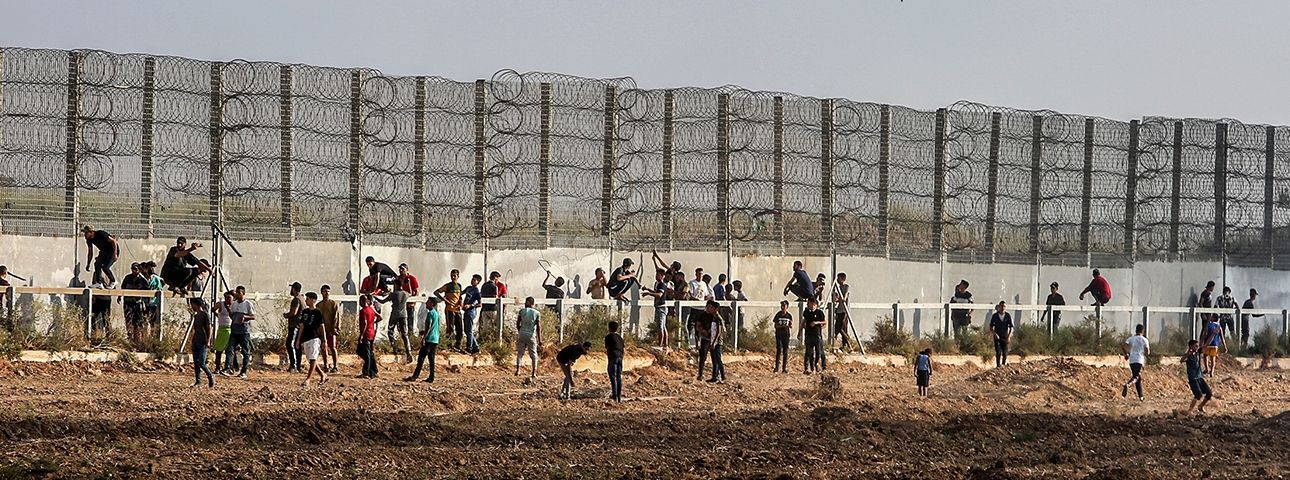The Silence of the Commanders
False quick-spreading claims blamed an IDF soldier's death on overly stringent rules of engagement. What took the military so long to set the record straight?

Flash 90
The inquiry into the incident in which Border Policeman Barel Hadaria Shmueli was killed in action on the Gaza border is still underway. Nevertheless, a social media campaign is raging against the IDF Chief Military Prosecutor (as an individual) and the entire military justice system, with many of the posts beginning with the phrase “Rules of Engagement.”
Furious tweets are demanding to know how much blood has been shed to date on account of those “evil men.” A gruesome Instagram campaign sports the slogan, “Untie Our Hands.” There are threats by scores of reserve soldiers to refuse to report for duty. And there are hundreds of angry posts by people jumping on the bandwagon to attack the senior command echelons who, supposedly with the support of a fainthearted government, are allegedly sending our finest young men to die on the altar of leftwing legal constraints.
Now that the IDF has published its preliminary investigation of this tragic incident, a picture is gradually emerging of a combination of operational failure and poor judgment by commanders in the field. Unfortunately, this is frequently one of the costs of war. But this was of no interest whatsoever among those who have been waiting eagerly for the opportunity to take Prime Minister Bennett’s immortal statement out of storage: “Our warriors are more worried about the Military Advocate General Corps than about [Hamas leader] Yahya Sinwar in Gaza.” and to hold forth unequivocally that the young man was killed because the open-fire orders had been tightened due to the excessive purism of an army that has forgotten what “lethal force” means and capitulated to the radical liberal agenda.
What really happened doesn’t matter, what counts is the golden opportunity the incident provides. Who will engage in debate at this moment of grief? Who dares mention that it is precisely these rules that distinguish base and murderous terror from painful combat that tries to cling to human values? Who will risk being denounced as soft on the enemy, as showing mercy to beasts who are cruel to our children? There is nothing like someone else’s agonizing bereavement to fuel unrestrained incitement.
Still, it must be said that the allegations sprouting up all over the internet are not new. A variety of interested parties promote the narrative that soldiers are afraid to shoot, don’t understand the open-fire orders or, worse still, understand them and realize they are being led like sheep to slaughter. Sometimes it is part of the methodical erosion of the entire gatekeeper system, exploiting the military to spread the idea that the judiciary is an enemy of the people; and sometimes it’s part of attempts to argue that in wartime the law should be silent and, ideally, the IDF’s restraining value of “Purity of Arms” and its entire ethical code should be muffled as well.
Two years ago, when the Israel Democracy Institute conducted a survey among combat soldiers, more than 60% responded that meticulous compliance with the law as dictated by the IDF Advocate General’s Office hobbles the IDF and makes it more difficult for it to perform its military missions. These results did not emerge in a vacuum, but rather are the product of the persistent, aggressive repetition of that message.
So now go and explain to the authors of all the tweets and those who reply to them, that the open-fire orders have not been changed. IDF commanders insist these orders are precisely what they should be and that there are no cases of soldiers who don’t shoot because they are afraid of the Advocate General, but they are not exactly shouting the message from the rooftops.
Maybe the IDF has simply decided to lie low until the storm passes. It doesn’t want to give the campaign greater prominence, so as to avoid a repetition of the free-for-all that ensued in the case of Elor Azariah, the soldier who shot dead an already neutralized terrorist in Hebron and whose court-martial turned him into a cause celebre for the right. It seems, however, that the horses have already bolted from this stable and are galloping full-speed ahead, threatening to trample what remains of the IDF’s values. This is too high a price to pay.
The late response on behalf of the IDF, emphasizing that the IDF would never turn its back on its guiding principles and ideals is dubious. When they want to, senior commanders can write letters, publish columns, or add specific statements to otherwise standard speeches. When a soldier freezes on the spot instead of charging the enemy, the IDF stands tall and insists on the importance of carrying out the mission. The brigade and division commanders, and even the Chief of Staff – no one keeps silent.
Insistence on an uncompromising commitment to the IDF’s code of ethics may not project a life-and-death message. Speaking out about moral fortitude doesn’t win popularity points. But one must display courage and a fighting spirit against bullies – even when the rabble is homegrown.
The article was published in Times of Israel.
